Every once in a while a fly comes along that doesn't discriminate in the type of fish
it attracts. Dave Braddish of Ormond Beach showed me how to tie the HOT LIPS
fly. It is without question the best warm-water, summer pattern for North Florida.
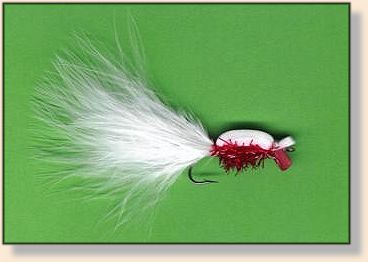
Capt. Kent Gibbens and I went out early last Thursday morning, we launched at Strickland
Creek, motored two miles to the Tomoka River and headed east. We past the Tomoka
State Park boat ramp and shot over to the northeast corner of the basin, along the weed line,
about 6 miles from the launch area. The sun was just peaking above the horizon.
Kent was using an 8 wt. Orvis Silver Label with floating line and 16 pound fluorocarbon
tippet. He shot his cast out about 80 feet from the boat and started the retrieve. On
his third strip, the baby snook nailed the fly and made a powerful run 80 yards west into
another canal. He didn't want to give up the fly. A dehooker was used to edge the fly
out through the gills. We then cut the line so that the line and fly fell free for a clean release.
Picture taken, the snook was lowered back into the water.
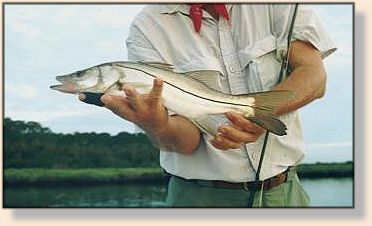
Two days later, I had a charter on the Tomoka. We moved eight miles up the Tomoka
River towards the State Road 40 overpass. The weather was perfect and my fly angler
was anxious to get a fly in the water. The area this far up the Tomoka hosts a number
of fresh and saltwater game fish including Long-nose Gar, Bowfin, Black Bass, Red Drum,
Black Drum, Bull Sharks and Jacks, along with numerous Alligators. The water looks dirty,
but it isn't. The blackness comes from decaying vegetation on the bottom because the
water within four feet of the shore is crystal clear.
I ran Twin Lenco Trolling Tabs to position the boat for my client's casts. Armed with a
Hot Lip fly (#2 Mustad 34011), he made his cast, let the fly settle, and started the retrieve.
On his last strip the fly got a big bump and push, but no hook up and we couldn't see the fish.
Jim pulled about 30 feet of line of the water and recast about 60 feet to the same spot.
Four strips later he was hooked up with his first Catfish on fly.
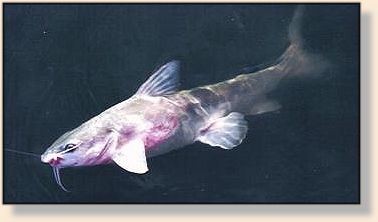
What a fight the Catfish gave him! This catfish did not want to relinquish the fly.
He lost. Hook dislodged he was freed to find something else to eat Since then we've
caught and released 8 snook to 12 pounds, 4 jacks to 25 pounds, 3 redfish to 30 pounds,
1 tarpon did a bump and run, and 4 spotted sea trout. I would say that is a proven test
for what this fly will deliver. So here it is, for you to tie.
This is what you need:
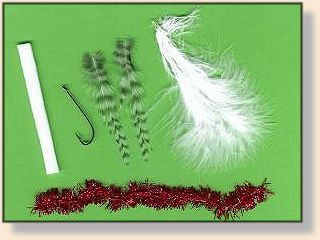
- Hook: Mustad #34011 (#2) Don't forget to pinch down that barb.
- Head: Thin Fly Foam (White) 2MM, cut ¼ inch wide by 3 inches long.
- Tail: White or Tan Saddle Hackle (2 @1 ½ inches), White Marabou.
- Body: Large Ice Chenille (Red). Cut a piece 5 inches long.
- Thread: White Flat Waxed Nylon.
- Super Glue or other fast drying adhesive.
This fly is tied using white Flat Waxed Nylon. Tie off a small section of thread in front
of the curve of the shank. I tie in a two short saddle hackles (white preferred but you
can use tan). Then tie in a small bunch of white marabou. Use a double half hitch for
this group. Now move the thread to just behind the hook eye.
Take the ¼ inch foam strip and using a pair of scissors punch a hole large enough so that
the hook eye will go through it. Once the foam is in place. Secure the bottom lip with
three wraps and a half hitch. Tie the red ice chenille in back of the foam, then wrap the
chenille in close loops back to the marabou. Now wind the thread in wide spirals back
to the marabou.
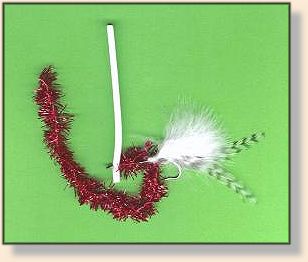
Next step is to lay the foam strip backwards over the chenille and tie snuggly just in front
of the marabou. Make three loops, pull tightly, make a couple of half hitches and then
a modified whip finish. Clip off the tag end towards the back of the foam.
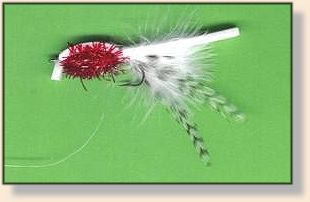
Squeeze a thin line of Super Glue along the top back of the foam. Pull the foam strip
forward tightly so the two sections are sealed together. The end of the foam strip is
now pointing forward of the hook eye.
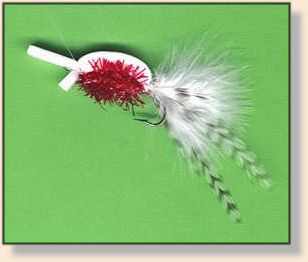
Tie the thread back on behind the hook eye and carefully wrap it around outside and
over the upper and lower lip. Secure with half hitch and do the final whip finish. Trim the
upper lip to be about the same size as the lower one. Using a red marker color the lower
lip red. There you have it. HOT LIPS!

You will be surprised by the effectiveness of this fly. Go catch some fish!
~ Doug
About Doug:
Capt. Doug Sinclair has relocated from New Smyrna Beach, Florida to
Grantsboro, NC. He specializes in fly-fishing and light tackle charters.
Doug charters the Coastal Carolina area of New Bern or Oriental.
Catch him on the web at
www.flyfishacademy.net or call him at (252) 745-3500.
Doug is also a Sponsor here on FAOL.
|









